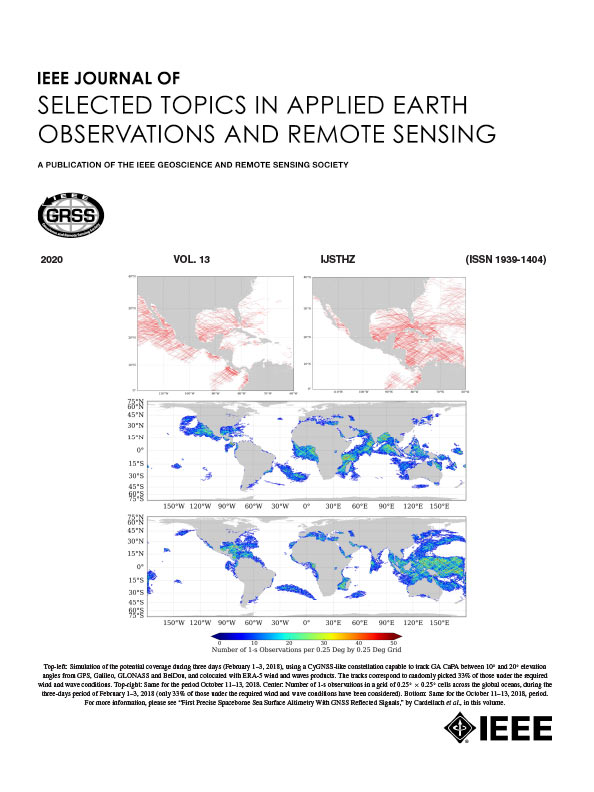基于深度互信息的场景分类鲁棒表示学习
IF 4.7
2区 地球科学
Q1 ENGINEERING, ELECTRICAL & ELECTRONIC
IEEE Journal of Selected Topics in Applied Earth Observations and Remote Sensing
Pub Date : 2025-04-28
DOI:10.1109/JSTARS.2025.3564376
引用次数: 0
摘要
遥感场景分类使数据驱动的决策能够用于各种应用,如环境监测、城市规划和灾害管理。然而,用于场景分类的深度学习模型非常容易受到对抗性样本的影响,从而导致不正确的预测并带来重大风险。虽然目前大多数方法都专注于提高对抗鲁棒性,但它们面临着折衷,即在干净、无扰动的图像上牺牲准确性。为了应对这一挑战,我们利用了信息论,结合了互信息(MI)表示模块,该模块允许模型捕获高质量、健壮的特征。此外,应用领域对抗训练策略促进领域不变特征的学习,减少干净图像和对抗样本之间分布差异的影响。我们提出了一种新的算法,通过引入MI和领域自适应引导网络来准确区分干净和对抗场景。大量的实验证明了我们的方法对对抗性攻击的有效性,揭示了对抗性扰动与图像信息熵之间的正相关关系,以及与鲁棒精度的负相关关系。本文章由计算机程序翻译,如有差异,请以英文原文为准。
Robust Representation Learning Based on Deep Mutual Information for Scene Classification Against Adversarial Perturbations
Remote sensing scene classification enables data-driven decisions for various applications, such as environmental monitoring, urban planning, and disaster management. However, deep learning models used for scene classification are highly vulnerable to adversarial samples, resulting in incorrect predictions and posing significant risks. While most current methods focus on improving adversarial robustness, they face a trade-off that compromises accuracy on clean, unperturbed images. To address this challenge, we utilized information theory by incorporating a mutual information (MI) representation module, which allows the model to capture high-quality, robust features. Furthermore, a domain adversarial training strategy is applied to promote the learning of domain-invariant features, reducing the effect of distribution differences between clean images and adversarial samples. We propose a novel algorithm that accurately differentiates between clean and adversarial scenes by introducing the MI and domain adaptation-guided network. Extensive experiments demonstrate the effectiveness of our approach against adversarial attacks, revealing a positive correlation between adversarial perturbations and image information entropy, and a negative correlation with robust accuracy.
求助全文
通过发布文献求助,成功后即可免费获取论文全文。
去求助
来源期刊
CiteScore
9.30
自引率
10.90%
发文量
563
审稿时长
4.7 months
期刊介绍:
The IEEE Journal of Selected Topics in Applied Earth Observations and Remote Sensing addresses the growing field of applications in Earth observations and remote sensing, and also provides a venue for the rapidly expanding special issues that are being sponsored by the IEEE Geosciences and Remote Sensing Society. The journal draws upon the experience of the highly successful “IEEE Transactions on Geoscience and Remote Sensing” and provide a complementary medium for the wide range of topics in applied earth observations. The ‘Applications’ areas encompasses the societal benefit areas of the Global Earth Observations Systems of Systems (GEOSS) program. Through deliberations over two years, ministers from 50 countries agreed to identify nine areas where Earth observation could positively impact the quality of life and health of their respective countries. Some of these are areas not traditionally addressed in the IEEE context. These include biodiversity, health and climate. Yet it is the skill sets of IEEE members, in areas such as observations, communications, computers, signal processing, standards and ocean engineering, that form the technical underpinnings of GEOSS. Thus, the Journal attracts a broad range of interests that serves both present members in new ways and expands the IEEE visibility into new areas.

 求助内容:
求助内容: 应助结果提醒方式:
应助结果提醒方式:


